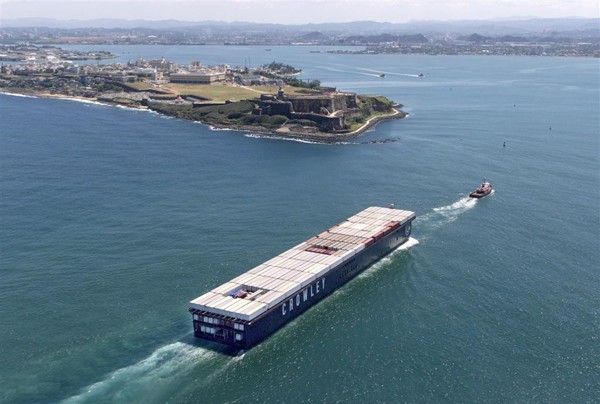Carriers currently use 17 vessels to provide shipping services, including 5 self-propelled containerships and 12 container barges that are pulled by tugboats, with an average age of 30 years for containerships and about 27 years for barges. Photo courtesy Crowley
The U.S. Government Accountability Office (GAO) has released its long-awaited findings from a study examining the affects of modifying the Jones Act for shipping goods between the U.S. and Puerto Rico following concerns by shippers that the law is driving rates higher, leading to an adverse impact on Puerto Rican consumers.
The Jones Act requires that goods transported between U.S. ports be shipped on U.S. built, owned, operated, and crewed vessels. In conducting their report, the GAO, which is an independent government agency, examined maritime transportation to and from Puerto Rico and how the Jones Act affects trade, along with any possible effects of modifying the application of the Jones Act in Puerto Rico.
What the study found was pretty much as to be expected; determining the “cost” of the Jones Act is a complicated issue, not to mention a slippery slope.
“The effects of modifying the application of the Jones Act for Puerto Rico are highly uncertain, and various trade-offs could materialize depending on how the Act is modified,” the GAO stated in its findings.
GAO says that Jones Act requirements have resulted in a ‘discrete shipping market’ between Puerto Rico and the United States, which consists mostly of four main carriers – Crowley, Horizon Lines, Sea Star Line and Trailer Bridge – providing regularly scheduled and reliable container service.
In its findings, the GAO says there is a lack of available data to verify or validate shippers’ claims that freight rates are lower for foreign carriers on international routes than those of Jones Act carriers on domestic routes, given the number of determining factors that influence freight rates and product prices.
“Freight rates are set based on a host of supply and demand factors in the market, some of which are affected directly or indirectly by Jones Act requirements,” the report states. “However, because so many other factors besides the Jones Act affect rates, it is difficult to isolate the exact extent to which freight rates between the United States and Puerto Rico are affected by the Jones Act.”
The study found that while average freight rates of the four major Jones Act carriers dropped as much as 17% between 2006 and 2010, the drop did coincided with the onset of the recession in Puerto Rico and therefor decreases in demand.
The GAO also explored the ‘what ifs’ of an exemption of the Jones Act, either in full or part, which did not help shippers’ claims.
“Under a full exemption from the Act, the rules and requirements that would apply to all carriers would need to be determined,” the findings said. “While proponents of this change expect increased competition and greater availability of vessels to suit shippers’ needs, it is also possible that the reliability and other beneficial aspects of the current service could be affected.”
Any modifications also raise concerns over the effects on the U.S. merchant marine and the U.S. shipbuilding industry, both of which are beneficial to national security.
“Furthermore, because of cost advantages, unrestricted competition from foreign-flag vessels could result in the disappearance of most U.S.-flag vessels in this trade, having a negative impact on the U.S. merchant marine and the shipyard industrial base that the Act was meant to protect.”
Citing MARAD data, the report said up to 1,400 mariners were crewed full-time on Jones Act vessels in Puerto Rico in 2011, including on offshore service vessels, harbor tugs, ferries, and barge services in addition to the Jones Act vessels named in the study.
The report only touched upon Jones Act dry and liquid bulk cargo vessels, which also operate in the market. “Some shippers report that qualified bulk-cargo vessels may not always be available to meet their needs,” the GAO said in the findings.
The study was mostly hailed by the U.S. maritime industry trade group, the American Maritime Partnership.
“GAO disproved charges that the Jones Act raises prices for consumers in Puerto Rico,” AMP said in a statement shortly after the release of the report.
“As such, GAO’s report confirmed that previous estimates of the so-called ‘cost’ of the Jones Act are not verifiable and cannot be proven. The GAO report demonstrates that many of the most pointed criticisms of the Jones Act came from individuals or groups that did not offer data to back up their concerns,” AMP added.
AMP said the GAO study is important because it gives a rare, detailed look into the Jones Act and is prepared by an independent government agency.
Speaking to the study, Secretary of the Maritime Alliance of Puerto Rico, José F. Nazario, also commented: “GAO’s study has found that shipping prices have dropped dramatically over the last two decades and consumers have benefited from regular, reliable service.”
“It also validated that the Jones Act enhances national security,” Nazario added.
The importance of the study was also highlighted by the president of the Hawaii Shippers Council, Michael Hanson, given its implications to Hawaii and the U.S. Pacific territories. The Hawaii Shippers Council is expected to release a full critique of the findings.
The GAO did not make any recommendations in the report.
A full copy of the report can be found on the GAO website.
Unlock Exclusive Insights Today!
Join the gCaptain Club for curated content, insider opinions, and vibrant community discussions.

 Join The Club
Join The Club













